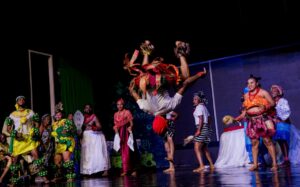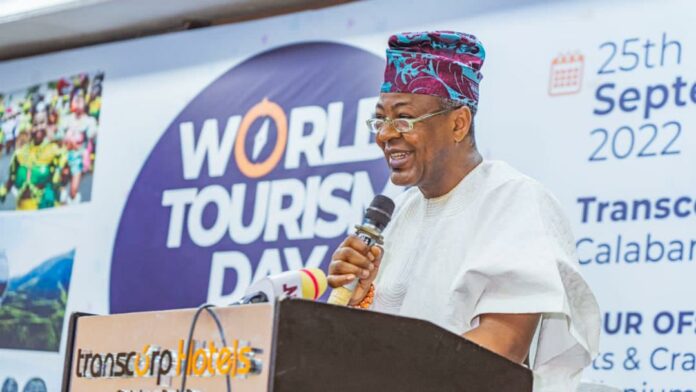Globally, the culture and creative industries constitute some of the huge drivers of economic activity that can be further purposed as greater stimuli for economic recovery
As we celebrate this 42nd edition of the World Tourism Day, this is within the frame of reflection on the urgency of building a practice that is environmentally sensitive and future complaint.
The need for a more inclusive, resilient and sustainable tourism has now forcefully come on the global agenda of governments, international organisations, businesses, and local communities, and we must all work together to mitigate the evident challenges and concerns, in a way that safeguards our planet.
It is a great delight to witness and mark the 42nd edition of the World Tourism Day (WTD). This is a day set aside to create awareness about tourism globally, while contemplating the different milestones that have been achieved so far, alongside the recognition of its importance as a crucial pillar of development, both here in Nigeria, and worldwide.
World Tourism Day offers an opportunity to come together and celebrate the many and varied accomplishments of our sector, particularly in its drive towards the attainment of the United Nations Sustainable Development Goals (SDGs). This yearly event celebrated on the 27th of September has become a formidable platform for constructive engagement with all tourism stakeholders across the value chain, and in different places across the world.
Of all sectors of the economy, tourism took the worst blow from the COVID-19 pandemic, and this has in turn highlighted the critical need to transform the industry as global tourism gradually recovers. Worldwide, tourism has entered into a durable stage of recovery, and it is quite heart-warming to note that this year alone international tourism has grown back to at least 60% of its pre-pandemic level.
READ Olota of Ota Visits Dufil Prime Headquarters, Commends CEO, Adhi Narto

According to estimates from the UNWTO World Tourism Barometer, international tourist arrivals almost tripled in the first seven months of 2022, as against the same period last year, and this reveals the strengthening of demand, as travels restrictions are lifted in many more countries (86 at the last count).
The impact that tourism has borne and the need to transcend this for all times makes the theme of this year’s event, “Rethinking Tourism”, quite apt. It not only recognises the relevance of tourism as one of the vital economic sectors globally but, more so, seeks to reconsider the practice of tourism by putting people and the planet first, as it brings all stakeholders – from governments to businesses and local communities – together to share in a vision for a more sustainable, inclusive and resilient sector.
While tourism remains the largest employer of labour, providing livelihoods to millions of people, most notably women and youth across the world, yet this comes with the awareness that the ecosystem of this earth we call home has become fragile with the years. Hence, the composite of activities making up tourism need to be more responsive to the demands of sustainability, as tourism’s economic and environmental footprint is greater than that of any other sector.
It goes without much saying that the opportunities embedded in tourism are enormous. However, to fully utilise the potentials of tourism for economic growth, we must also recognise that we cannot continue in the old ways of practice, and there is the urgent need to reflect on and rethink what we do and how we do it.
We believe it is time to begin the transformation that the sector requires. Like most changes in approach, this will not be easy but we are already well on the way. The crisis that came with COVID-19 was a catalyst and inspiration for creativity, and change.
As efforts at rethinking tourism points the focus on the future, this is certainly a future in which Nigerian tourism is primed to be a major driver of, indicated in its positioning for greater activities and attraction. As the Honourable Minister of Information and Culture, Alhaji Lai Mohammed puts it, this edition of the World Tourism Day, “is particularly important…because of the right granted to Nigeria by the United Nations World Tourism Organisation (UNWTO) to host the first-ever UNWTO Global Conference on ‘Linking Tourism, Culture and the Creative Industries: Pathways to Recovery and Inclusive Development’.”
While tourism remains the largest employer of labour, providing livelihoods to millions of people, most notably women and youth across the world, yet this comes with the awareness that the ecosystem of this earth we call home has become fragile with the years. Hence, the composite of activities making up tourism need to be more responsive to the demands of sustainability, as tourism’s economic and environmental footprint is greater than that of any other sector.
He further points out that: “The conference which is scheduled to hold from 14th to 16th November 2022 at the National Theatre Complex, Iganmu, Lagos, provides and opportunity to showcase Nigeria tourism and creative assets. It also creates a viable platform to identify, promote and develop new models of stronger partnership between tourism, culture and the creative industries as highly interlinked sectors for inclusive economic growth and social development.”
Globally, the culture and creative industries constitute some of the huge drivers of economic activity that can be further purposed as greater stimuli for economic recovery. This is evident from their documented impact, seeing to the generation of an annual compound value of close to $2.3 trillion, as representation of about 3% of the world’s GDP, according to UNWTO estimates.
Moreover, about 40% of international tourists are observed as ‘motivated primarily by culture-related experiences’ for embarking on destinations. Therefore, it is quite safe to project that the culture and creative industries could become significant catalysts of recovery and growth in a resurgent global economy, steadily breaking out of the negative impacts of the pandemic.
The creative and culture industries in Nigeria are an extended composite of a number of interconnected and linked sectors, cutting through a sizeable gamut of economic activities and responsible for between 10 and 15 million jobs, from music to design, fashion, film, television, radio, photography, architecture, printing and performance arts. Also, hotel and hospitality, publishing, information technology, gaming, software development, advertising and digital marketing, etc.
The culture and creative industries have been some of the priority sectors earmarked for intensive development in the Federal Government’s stimulus strategy as laid out in the Economic Renewal and Growth Plan (ERGP). This is a major effort being made to recoup lost grounds and create new value that drives sturdier economic growth, thereby resuscitating and expanding the jobs and income pool.
At NTDC, we realised early enough that any proposed strategic path for recovery envisaged for the industry must leverage on innovative and disruptive tech ideas to enhance and promote domestic tourism. This form of tourism is cheaper, with lesser restrictions, and it offers educational opportunities to citizens of the country, whilst generating employment and revenue, in addition to reducing poverty. Domestic tourism galvanises economic growth across sectors, including agriculture and manufacturing, contributes to infrastructure upgrade in rural and urban areas by encouraging government’s commitment to its development, and it largely enhances the creative sector.
According to the UNWTO briefing note, “Tourism and COVID-19”, issue 3 of September 2020, domestic tourism is six times larger than international tourism and it accounts for more than a 70% share of domestic trips globally.
The vibrant promotion of domestic tourism is the first step to resetting the tourism and hospitality industry in a post-pandemic era where there are endless possibilities for development of our rural communities, and where a lot of our tourist sites are located.
The future of the tourism industry is here and we need to be prepared for the emergent opportunities and challenges, which with require a greater form of collaboration across sectors. Foremost, there is need to review regulations guiding the sector’s operations and operators, to standardise service delivery by both public and private sector partners and deploy a strategic stakeholder approach to the development of sustainable tourism practices.

Moreso, at the Nigerian Tourism Development Corporation (NTDC), we have focused on and given critical support to the country’s creative and cultural assets, with emphasis on the digital promotion of the diverse cultural expressions of our music, film, arts, dance, fashion, cuisine and festivals. These are all game changers that accentuate the desire to witness and experience Nigeria, as such intimately engaging the creative sector and tourism products to create new experiences for targeted consumers, tourists and investors.
In line with our agenda to encourage domestic and regional tourism, we created the Tour Nigeria brand to drive the domestic consumption of our tourism assets and products, create new channels of tourism markets, along with employment, and increase the nation’s GDP, by boosting spending that will grow the economy, among others. Tour Nigeria is poised to strongly complement international recovery efforts by stimulating demand locally in a way that grows the confidence to inspire Nigerian destination marketing internationally.
The future of the tourism industry is here and we need to be prepared for the emergent opportunities and challenges, which with require a greater form of collaboration across sectors. Foremost, there is need to review regulations guiding the sector’s operations and operators, to standardise service delivery by both public and private sector partners and deploy a strategic stakeholder approach to the development of sustainable tourism practices.
Secondly, there is the necessity of effective participation by, and community ownership at rural levels, as agents of change in tourism transformation. The third level requires the deployment of technology and digital techniques for easy and safe travel.
The potentials of tourism are enormous and we all have a shared responsibility to make sure it is fully realised. We hereby call on all tourism stakeholders and everyone at the base of the broad and diverse tourism pyramid to pause, reflect and rethink what we do and how we do it.
Tourism entrepreneurs are encouraged to embrace technology to gain more mileage and penetration, and acquire adequate knowledge in the proficient use of digital platforms to promote and market existing tourist sites and attractions. This is in addition to ensuring effective service delivery and sustainable practices to grow and protect the tourism industry.
With over 147 million active Internet subscriptions and a tele-density of almost 97%, we have a readymade and vast domestic market for the development of tourism locally.
As we celebrate this 42nd edition of the World Tourism Day, this is within the frame of reflection on the urgency of building a practice that is environmentally sensitive and future complaint. The need for a more inclusive, resilient and sustainable tourism has now forcefully come on the global agenda of governments, international organisations, businesses, and local communities, and we must all work together to mitigate the evident challenges and concerns, in a way that safeguards our planet. The future of tourism is here, and it depends on our collective senses of responsibility.
Folorunsho Coker is the Director General of the Nigerian Tourism Development Corporation (NTDC) and the chief marketer of the Nigerian destination.















